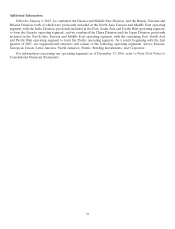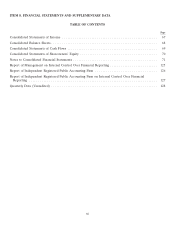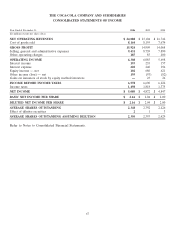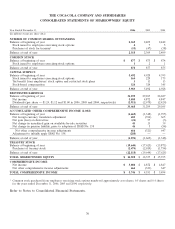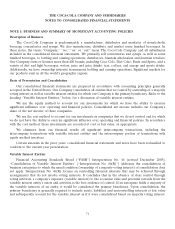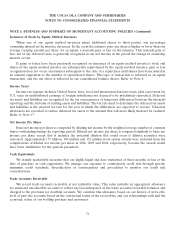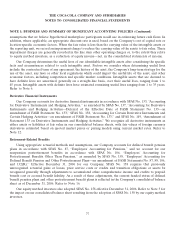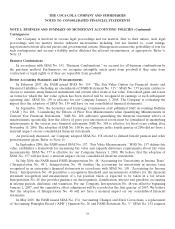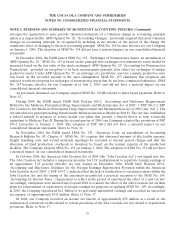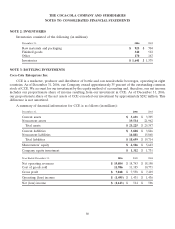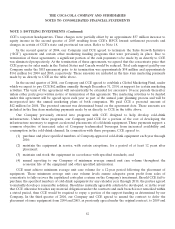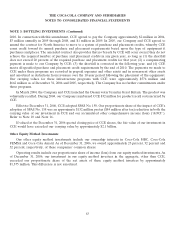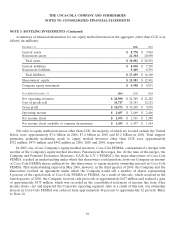Coca Cola 2006 Annual Report Download - page 76
Download and view the complete annual report
Please find page 76 of the 2006 Coca Cola annual report below. You can navigate through the pages in the report by either clicking on the pages listed below, or by using the keyword search tool below to find specific information within the annual report.THE COCA-COLA COMPANY AND SUBSIDIARIES
NOTES TO CONSOLIDATED FINANCIAL STATEMENTS
NOTE 1: BUSINESS AND SUMMARY OF SIGNIFICANT ACCOUNTING POLICIES (Continued)
Issuances of Stock by Equity Method Investees
When one of our equity method investees issues additional shares to third parties, our percentage
ownership interest in the investee decreases. In the event the issuance price per share is higher or lower than our
average carrying amount per share, we recognize a noncash gain or loss on the issuance. This noncash gain or
loss, net of any deferred taxes, is generally recognized in our net income in the period the change in ownership
interest occurs.
If gains or losses have been previously recognized on issuances of an equity method investee’s stock and
shares of the equity method investee are subsequently repurchased by the equity method investee, gain or loss
recognition does not occur on issuances subsequent to the date of a repurchase until shares have been issued in
an amount equivalent to the number of repurchased shares. This type of transaction is reflected as an equity
transaction, and the net effect is reflected in our consolidated balance sheets. Refer to Note 4.
Income Taxes
Income tax expense includes United States, state, local and international income taxes, plus a provision for
U.S. taxes on undistributed earnings of foreign subsidiaries not deemed to be indefinitely reinvested. Deferred
tax assets and liabilities are recognized for the tax consequences of temporary differences between the financial
reporting and the tax basis of existing assets and liabilities. The tax rate used to determine the deferred tax assets
and liabilities is the enacted tax rate for the year in which the differences are expected to reverse. Valuation
allowances are recorded to reduce deferred tax assets to the amount that will more likely than not be realized.
Refer to Note 17.
Net Income Per Share
Basic net income per share is computed by dividing net income by the weighted average number of common
shares outstanding during the reporting period. Diluted net income per share is computed similarly to basic net
income per share except that it includes the potential dilution that could occur if dilutive securities were
exercised. Approximately 175 million, 180 million and 151 million stock option awards were excluded from the
computations of diluted net income per share in 2006, 2005 and 2004, respectively, because the awards would
have been antidilutive for the periods presented.
Cash Equivalents
We classify marketable securities that are highly liquid and have maturities of three months or less at the
date of purchase as cash equivalents. We manage our exposure to counterparty credit risk through specific
minimum credit standards, diversification of counterparties and procedures to monitor our credit risk
concentrations.
Trade Accounts Receivable
We record trade accounts receivable at net realizable value. This value includes an appropriate allowance
for estimated uncollectible accounts to reflect any loss anticipated on the trade accounts receivable balances and
charged to the provision for doubtful accounts. We calculate this allowance based on our history of write-offs,
level of past-due accounts based on the contractual terms of the receivables, and our relationships with and the
economic status of our bottling partners and customers.
74


